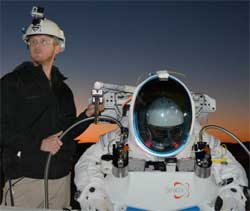Eustace breaks sound barrier in jump from space

The record dive by 57-year-old Eustace, who is a Senior Vice President of Knowledge at Google, was conducted as part of the Stratospheric Explorer project to allow manned exploration of the stratosphere above 30,000m.
According to a statement from the Paragon Space Development Corporation, Eustace completed the four-hour mission over Roswell, New Mexico, using a specially designed space suit and balloon module to carry him to the stratosphere.
"Ascending at about 300m a minute, Eustace achieved his target altitude in about two and a half hours," the statement said.
"He spent a short time, about 30 minutes, experiencing the wonders of the stratosphere before being released from the balloon. In rapid free fall, Eustace experienced a short period of near weightlessness and within 90 seconds exceeded the speed of sound."
The previous record was set by Austrian skydiver Felix Baumgartner in 2012, jumping from a height of nearly 128,000 feet or 38,969m, also above New Mexico.
"Eustace's free-fall into the atmosphere lasted about five minutes, and he deployed his parachute at about 6,000 and floated gently to the ground," the statement said.
Eustace beats Baumgartners record
"Within four hours of launch, Alan arrived at the launch site where the team and guests toasted his achievement and safe return," it said.

Paragon produced the recovery systems for the project, designed by the engineering firm ILC Dover with assistance from several other consultants and companies.
The New York Times, which first reported the news, quoted Eustace as saying, "It was amazing. It was beautiful. You could see the darkness of space and you could see the layers of atmosphere, which I had never seen before."
The Times said that Eustace was propelled from the module with a small explosive charge, sending him traveling briefly at supersonic speeds, creating a sonic boom heard by observers on the ground.
According to Paragon, the system has wide-ranging applications for the study of the science of the stratosphere.
These include the development of means for spaceship crew egress, the study of dynamics of bodies at Mach 1, new high altitude aircraft suits, and setting of records for space diving, sail-planing and ballooning.
Paragon warns that without special equipment, humans cannot live at that altitude, as they are unable to breathe, expose to the vacuum of space and risk the fluids in their body starting to boil.
"The space suit used by Eustace is similar to those used for the Apollo missions and on the International Space Station," the company said.
Source: AFP via I-Net Bridge







